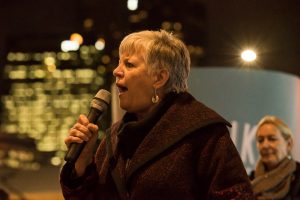
Protection Denied, Abuse Condoned: Women on Nauru At Risk Report
This ground-breaking report on the rape and assaults on women on Nauru was written by Australian Women in Support of Women on Nauru (AWSWN) on the impacts Australia’s detention policy is having on the lives and bodies of women on Nauru.
A breakdown of the findings:
- The Australian Government should immediately end offshore detention in the wake of the violent and sexual abuse suffered by women
- Those refugees and women seeking asylum who have been abused should be compensated
- The government is complicit in the abuse
- Public opinion shifts against hard-line policies regarding people seeking asylum and refugees because of the shocking treatment exposed in offshore detention
The abuse of refugees and women seeking asylum has become troublingly routine on Nauru and ‘is being condoned by the Australian government’, a report has found.
The report has called for widespread changes to the handling of refugees and people seeking asylum on Nauru to ensure the safety of women, who are increasingly being subject to sexual and physical violence.
The Protection Denied, Abuse Condoned: Women on Nauru at Risk report was written by Wendy Bacon, Pamela Curr, Carmen Lawrence, Julie Macken and Claire O’Connor.
The authors form part of the Asylum Seeker Resource Centre-backed group Australian Women in Support of Women on Nauru.
Women seeking asylum and female refugees who have been abused courageously spoke for the first time about their disturbing experiences in the report.
A detailed chronology of recent media articles and broadcasts, an outline of other reports compiled by non-government organisations, and a summary of independent inquiries into offshore detention is also included.
Thirteen recommendations are made in the report, including an immediate end to offshore processing and a marked increase in the intake of refugees.
“As a matter of urgency and reputation Australia must once again agree to abide by the international conventions that we have signed in good faith,” the report states.
“All cases of abuse and neglect must be investigated by an Inquiry with powers of subpoena. Investigation must at all time respect the privacy and confidentiality of victims.
“Those who have been harmed as a result of actions by the Australian government should be compensated.”
The report found it was clear women would be subject to brutal abuse when the decision was made to reopen Pacific detention centres in 2012.
“When reopening the detention centres, the violence, systemic humiliation and sexual abuse of women in the centre were entirely predictable.
“The physical layout of the camp – not to mention the culture and secrecy of the Nauruan community and the powerlessness of the refugees – all but ensured the violence that followed.”
Because of the horror inflicted on women and children in offshore detention, public opinion was starting to turn away from the support of hardline refugee and people seeking asylum police, the authors found.
The case of Asha, a one-year-old girl who suffered terrible burns on Nauru, had helped this movement. Asha was to be sent back to Nauru with her parents, despite her injuries, sparking a vigil outside the Brisbane hospital where she was being treated. The family were eventually resettled in community housing in Australia.
“Despite the apparent appeal of such a hard-line policy to some sections of the Australian public, the treatment of asylum seekers is increasingly a divisive and hotly contested issue,” the report states.
“In February this year the plight of baby Asha catalysed action nationally across a number of professional, religious and community groups.”
Read the report here: www.awswn.org/the-report/
 ASRC Detention Rights Advocate is a board director of Australian Women in Support of Women on Nauru (AWSWN) who produced the report, Protection Denied, Abuse Condoned: Women on Nauru At Risk. In her role at ASRC, Pamela is head of the Detention Rights Advocacy Program which focuses on advocating for individuals in detention and supporting other advocates working with people in detention (including strategic litigation) by giving them a voice.
ASRC Detention Rights Advocate is a board director of Australian Women in Support of Women on Nauru (AWSWN) who produced the report, Protection Denied, Abuse Condoned: Women on Nauru At Risk. In her role at ASRC, Pamela is head of the Detention Rights Advocacy Program which focuses on advocating for individuals in detention and supporting other advocates working with people in detention (including strategic litigation) by giving them a voice.
The program’s work includes lobbying for an end to mandatory detention, time limits on detention and an end to offshore processing.
Leave a reply

Connect with us
Need help from the ASRC? Call 03 9326 6066 or visit us: Mon-Tue-Thur-Fri 10am -5pm. Closed on Wednesdays.